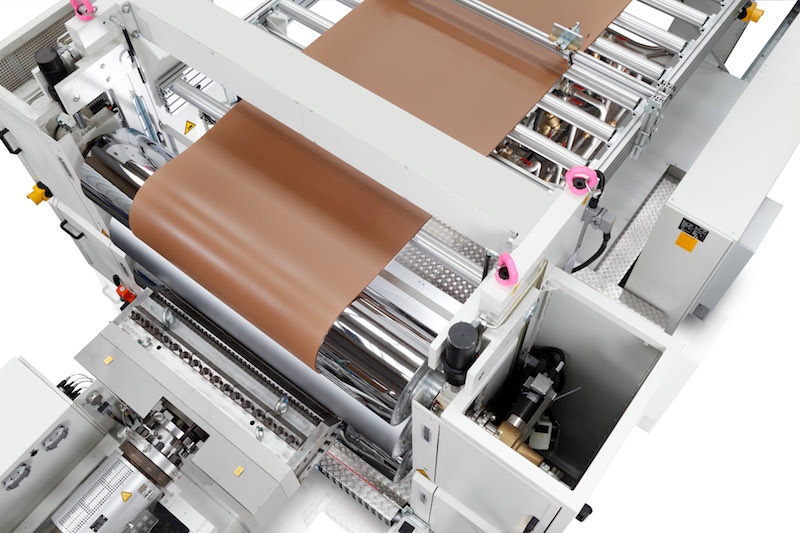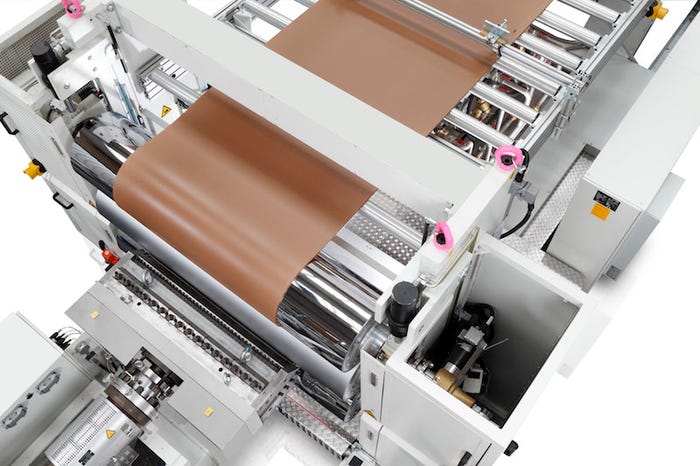At a live demonstration at its TechCenter in Munich, KraussMaffei Berstorff successfully produced sheets of Resysta, a fiber reinforced composite material consisting of 60% rice husk, 22% common salt and 18% mineral oil on a twin-screw extruder in the 32D series. Over 60 international visitors attended the event. "Our customers showed an unexpectedly high level of interest in this innovative product," said Andreas Kessler, general sales manager at KraussMaffei Berstorff in Munich.
March 31, 2014

At a live demonstration at its TechCenter in Munich, KraussMaffei Berstorff successfully produced sheets of Resysta, a fiber reinforced composite material consisting of 60% rice husk, 22% common salt and 18% mineral oil on a twin-screw extruder in the 32D series. Over 60 international visitors attended the event. "Our customers showed an unexpectedly high level of interest in this innovative product," said Andreas Kessler, general sales manager at KraussMaffei Berstorff in Munich.
 The sheet production line - equipped with the KMD 90-32/WPC twin-screw extruder and a vertical three-roll polishing stack as the key components - produced 4-mm-thick, 1000-mm-wide Resysta sheets with a guaranteed output of 300 kg/h. According to Andreas Kessler, the use of renewable raw materials in sheet extrusion is rising fast, due to growing worldwide demands for sustainable production. KraussMaffei Berstoff is responding to this trend with the development of new technology for the processing of natural fiber-reinforced plastics, and, in that context, recently started collaborating with Resysta International GmbH, a company based in Taufkirchen near Munich, which distributes its patented compound Resysta ARF all over the world.
The sheet production line - equipped with the KMD 90-32/WPC twin-screw extruder and a vertical three-roll polishing stack as the key components - produced 4-mm-thick, 1000-mm-wide Resysta sheets with a guaranteed output of 300 kg/h. According to Andreas Kessler, the use of renewable raw materials in sheet extrusion is rising fast, due to growing worldwide demands for sustainable production. KraussMaffei Berstoff is responding to this trend with the development of new technology for the processing of natural fiber-reinforced plastics, and, in that context, recently started collaborating with Resysta International GmbH, a company based in Taufkirchen near Munich, which distributes its patented compound Resysta ARF all over the world.
"The material mixture supplied by our cooperation partner Resysta is a specially developed fiber-reinforced hybrid material made of ground treated rice husks with an added PVC carrier material," said Peter Oswald, head of product management at KraussMaffei Berstorff. "We systematically geared our machine concept to these requirements. For example, a specific metering device ensures a constant material feed. Since the adapted special venting zone in our 32D twin-screw extruders ensures that the residual moisture can properly escape, the moisture content during the production process remains constantly below 0.6%."
A high installed screw torque, coupled with internal screw heat balancing and screw geometry specially modified for the Resysta compound, guarantees a homogeneous melt, thus leading to a premium quality end product. "Another 'must' for Resysta processing machines is active wear resistance," Oswald said. "Screws must have wear proof protection well beyond the normal level of wear resistance while the barrels must also be lined to a correspondingly high degree. This combination ensures maximum protection of the processing unit against corrosive and adhesive wear during processing of the Resysta compound."
Resysta requires little maintenance and has both the look and feel of natural wood. It offers outstanding mechanical and weathering properties. The end product is extremely UV-resistant, does not rot or form cracks or splinters. The material is colorfast and can be recycled.
About the Author(s)
You May Also Like


